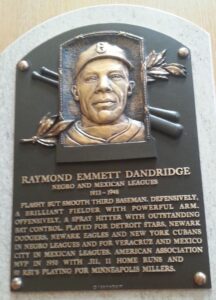On March 3rd, 1987 a long-distance telephone call came to the home of Ray Dandridge. It was a call well remembered by Mr. Dandridge in a speech given that summer in Cooperstown, New York.
“I was resting and my wife was in the backyard. So, I answered the phone. The phone caller says, I’m trying to find Ray Dandridge. I say, I’m Ray Dandridge. Are you Ray Dandridge the ball player? I said, yeah. And all the sudden he said, your life has changed. I said, what do you mean my life has changed? I said, sometimes you know you get crank calls. So afterwards, me and him and talk awhile and then he said, I’m Ed Stack, President of the Hall of Fame and you have just been elected to the Hall of Fame. I want to thank each and every member of the Veterans Committee for allowing me to smell the roses. My only question is, why did you take so long?”
And just like that Mr. Dandridge, long time third baseman for the Negro League Newark Eagles became a member of the Baseball Hall of Fame.
Over three hundred Virginians have played major league baseball since 1889 and a yet unknown number have played in the Negro Leagues. Most ballplayers had a short and unremarkable career such as, Clarence Pickerel of Gretna, Virginia. In two seasons, back in the 1930s, Pickerel pitched nineteen games for the Phillies and the Braves. A handful of ball players would prove to be fan favorites such as King George’s Al Bumbry. Bumbry was the American League Rookie of the Year in 1973 and revered by Baltimore Orioles fans. But only four native-born Virginians can claim the mantle of baseball immortality in Cooperstown.
Born in 1913, Ray Dandridge was native of Richmond and played for eleven different baseball clubs. His best years were with the Negro League Newark Eagles. Hall of Famer Monte Irvin said of Dandridge, “Dandridge didn’t play in the majors, but he had major league talent. He was a superstar.” Dandridge grew weary of the low pay and the shaky fortunes of the Negro Leagues. From 1943 to 1948 Dandridge earned $10,000 a season plus living expenses from the Mexican League club Azures de Veracruz. He turned down an offer from Cleveland Indians owner Bil Veeck to play major league ball in 1949.
Fauquier native, Jud Wilson played twenty-four years in the Negro Leagues. Primarily with the Philadelphia Stars, Wilson was known as the hardest hitting third baseman in the league. While his hits did not elevate, they were rifle shots that would crash off of wooden outfield fences. Thus, earning the nickname “Boojum.” Outfielder Double Duty Radcliffe remarked, “He was a better player than Josh Gibson. He didn’t hit as many homeruns, but he so many doubles and singles.” Wilson hit above .400 four times in his career. The World War One veteran died in 1963 and is buried in Arlington National Cemetery. A Cooperstown Veterans Committee elected Wilson to the Hall of Fame in 2006.
Hailing from Mitchells, Virginia, centerfielder Pete Hill was compared with Ty Cobb in the early twentieth century. His combination of speed, hitting power, and a rocket throwing arm made Pete Hill a player to build a franchise around. Playing for twelve different Negro League teams Pete Hill is best remembered for his ability to fight off tough pitches, take balls, and wind up on base. In 1910, the Chicago Defender printed, “He can do anything a white player can do. He can hit, run, throw and what is termed a wise and heady ball player.” Mr. Hill died in 1951 and was elected to the baseball Hall of Fame in 2006.
In a career spanning from 1912 until 1933, Culpeper native Eppa Rixey was a feared southpaw pitcher. National League umpire and University of Virginia coach Cy Rigler, recommended Rixey to the Philadelphia Phillies. The team immediately placed the UVA graduate into the starting rotation and is one of the few major league Hall of Famers to skip the minor leagues. In the off season, Rixey pursued a Master’s degree in Chemistry from UVA and served during World War One in the army’s Chemical Warfare Division. Rixey is best remembered for his many years on the mound for the Cincinatti Reds He is still regarded as the best southpaw in franchise history — 266 career victories Clyde Sukeforth said this about Eppa Rixey, “He was a fierce competitor and a hard loser. When he pitched you didn’t have to ask who won the game, all you had to do was look at the club house later. If he’d lost, the place would like a tornado had gone through it. Chairs would be broken up, tables knocked over, and equipment all around.” After baseball, Mr. Rixey was a chemistry and Latin teacher at Episcopal High School in Alexandria. He died one month after his election to the Hall of Fame in 1963.
In 2006, the Hall appointed a Committee on African-American Baseball: 94 candidates were screened, 17 were elected, and 3 players were from Virginia.
Virginia has a long and storied baseball tradition. Tens of thousands of our youngsters have played the national pastime. Hundreds have played professionally. But only four are enshrined at Cooperstown. Pete Hill, Jud Wilson, Ray Dandridge, and Eppa Rixey are remarkable and skilled athletes that all Virginians can celebrate.
Today is one of the great traditions of springtime: opening day for baseball.
Let’s play ball!
James Wyatt Whitehead V is a retired Loudoun County history teacher.
Works Cited and Interesting Links:Rixey, Eppa | Baseball Hall of FameWilson, Jud | Baseball Hall of FameHill, Pete | Baseball Hall of FameDandridge, Ray | Baseball Hall of FameMajor League Baseball Players Born in Virginia (baseball-almanac.com)Results of Special Negro Leagues and Pre-Negro Leagues Elections (archive.org)Ray Dandridge 1987 Hall of Fame Induction Speech – YouTubePete Hill – Baseball Hall of Fame Biographies – YouTube
